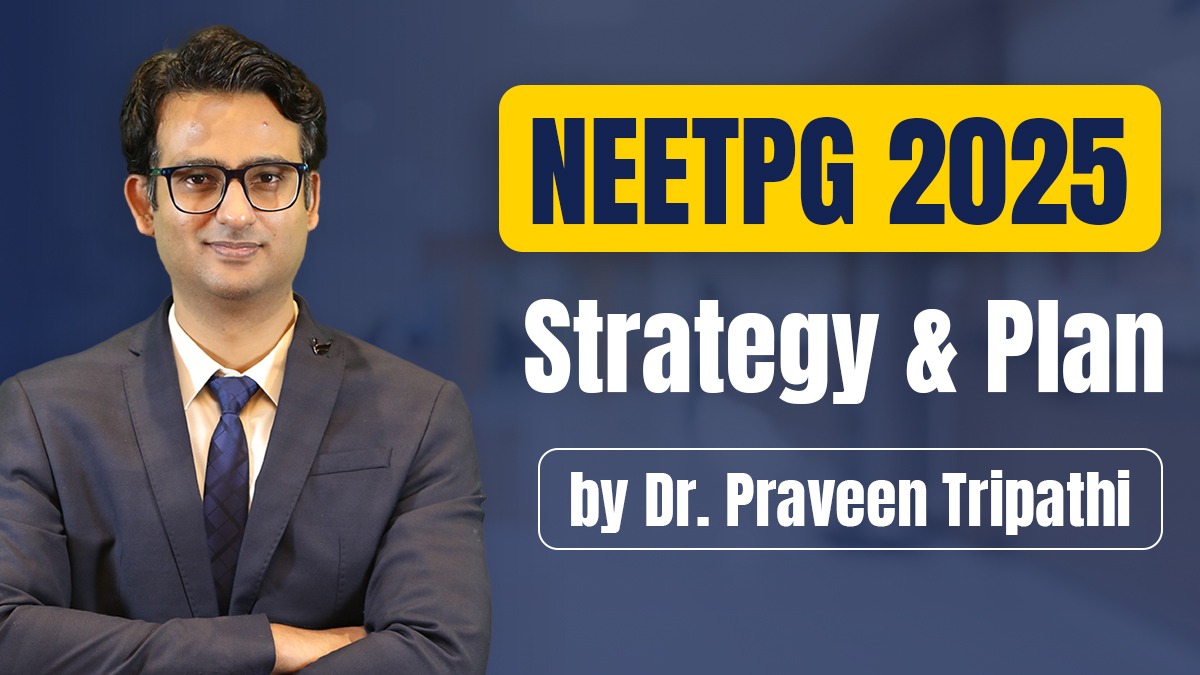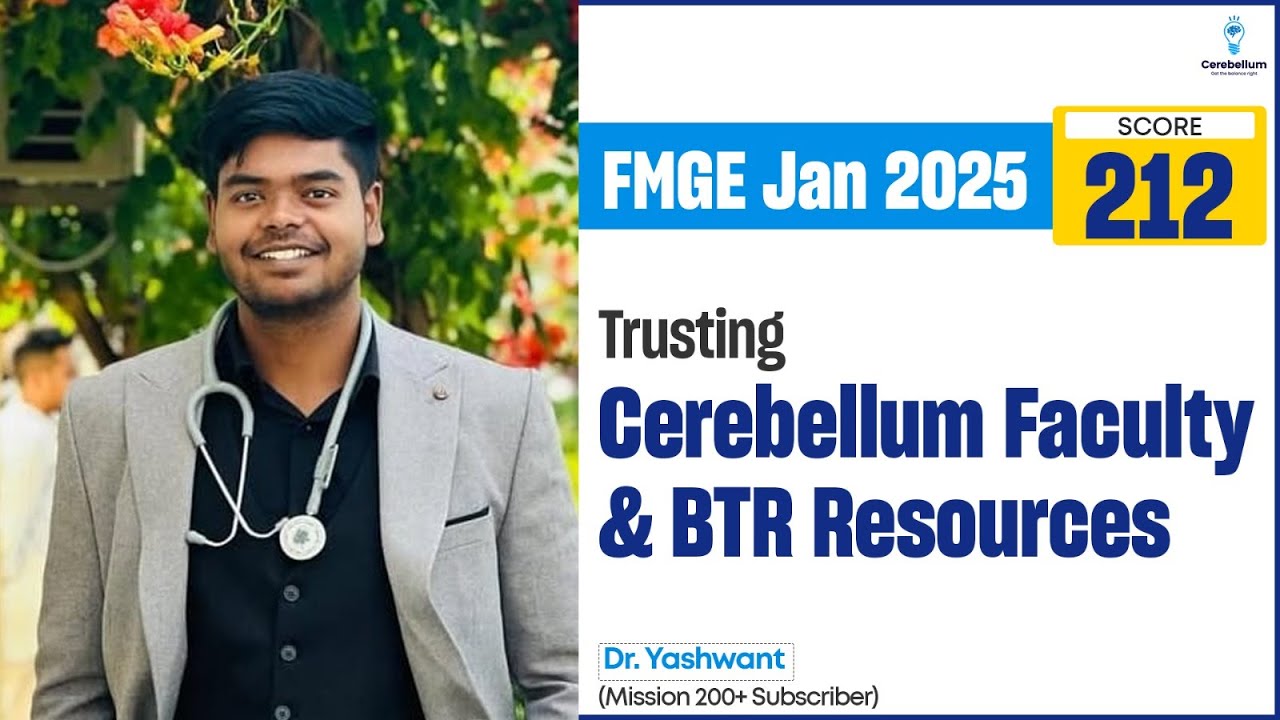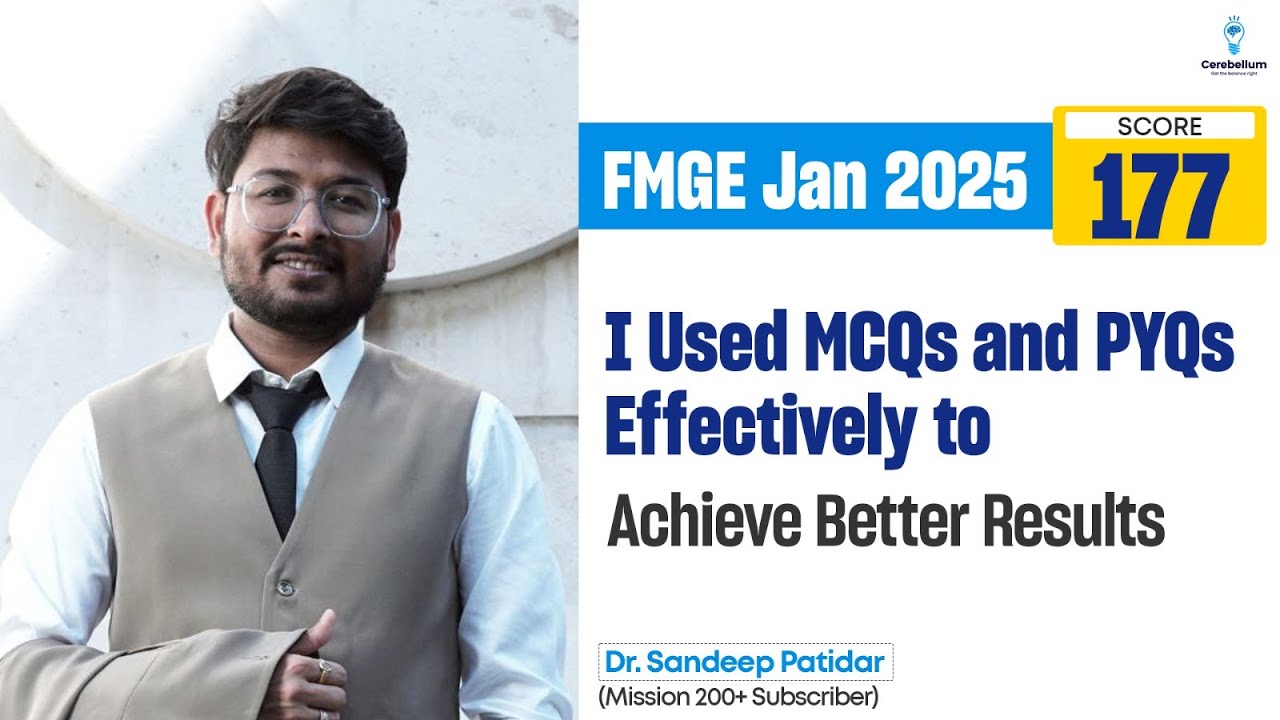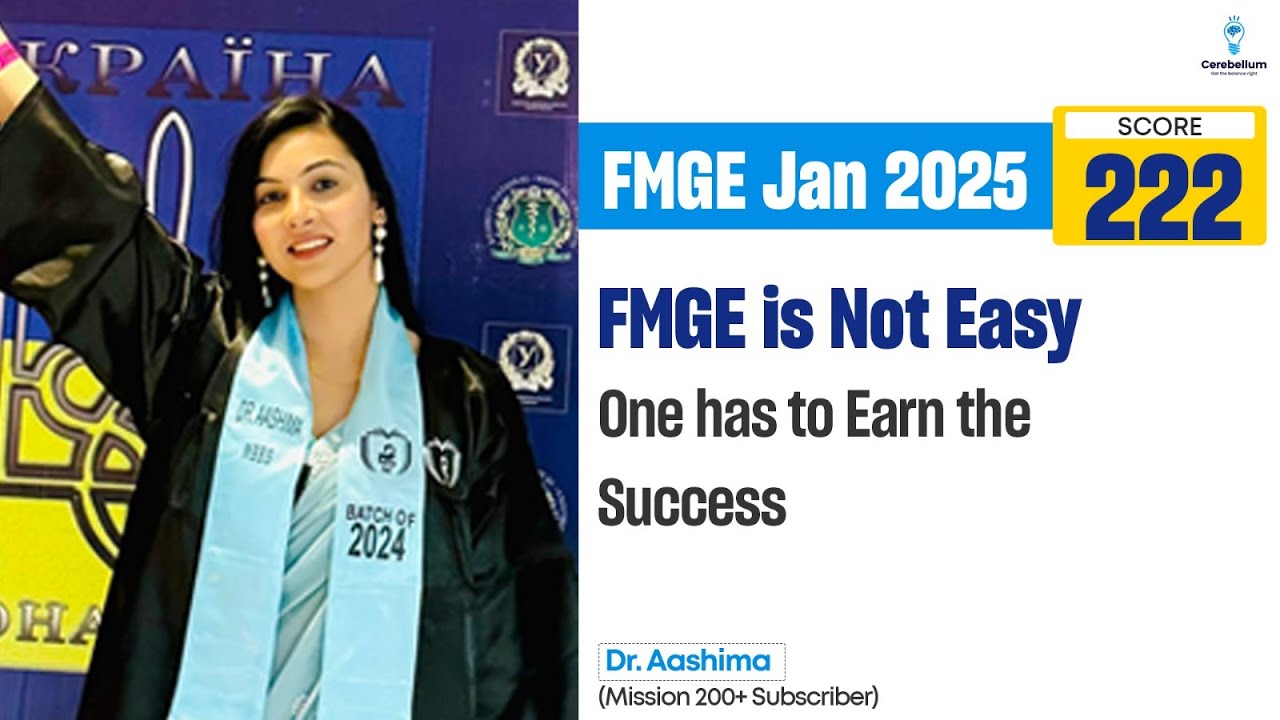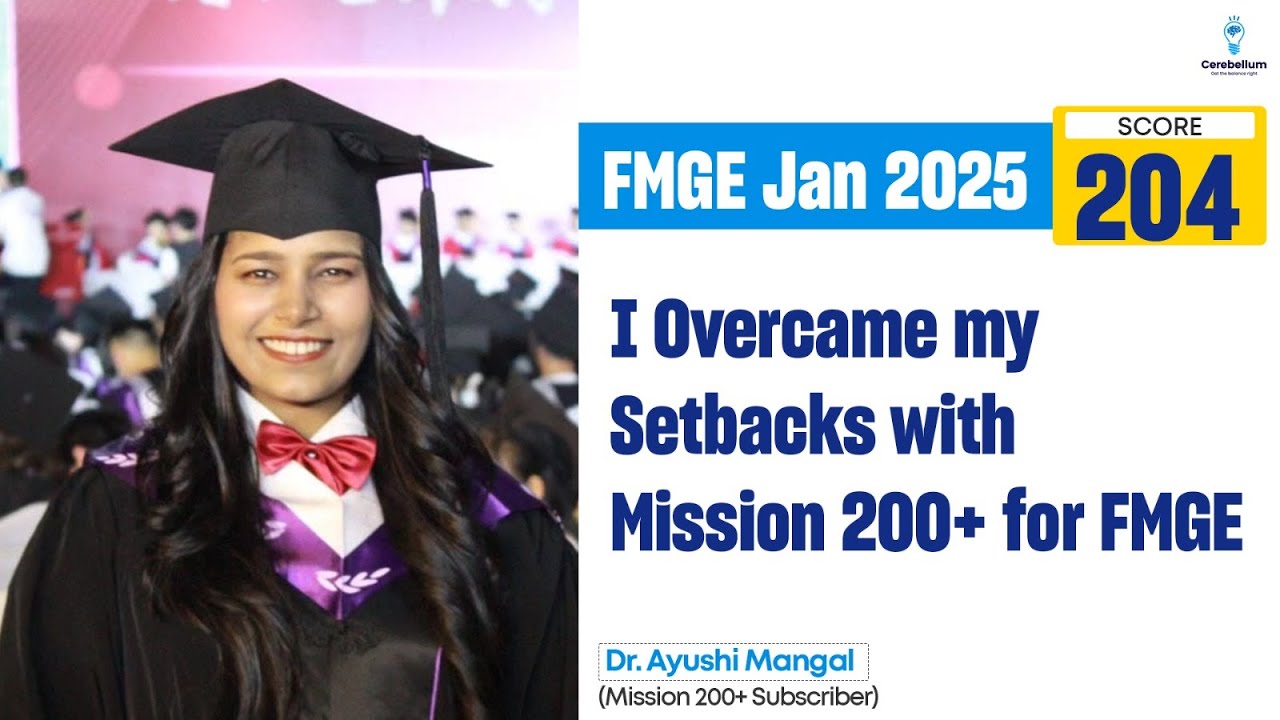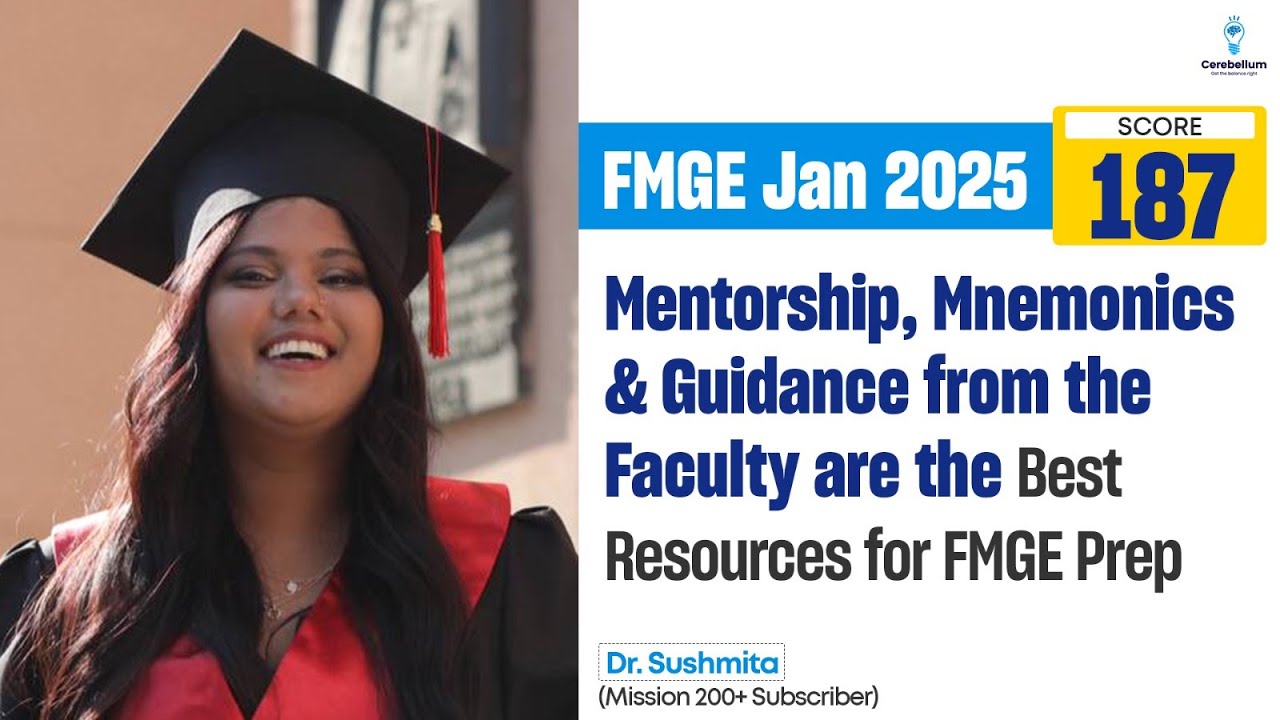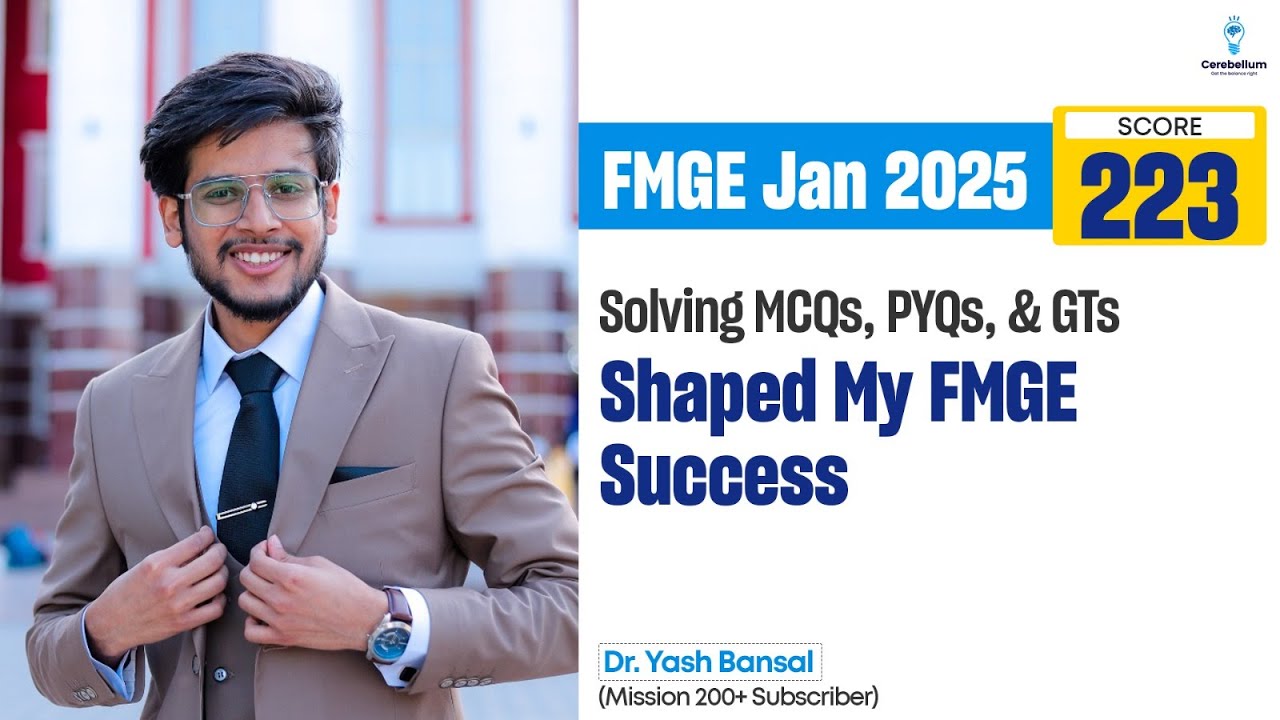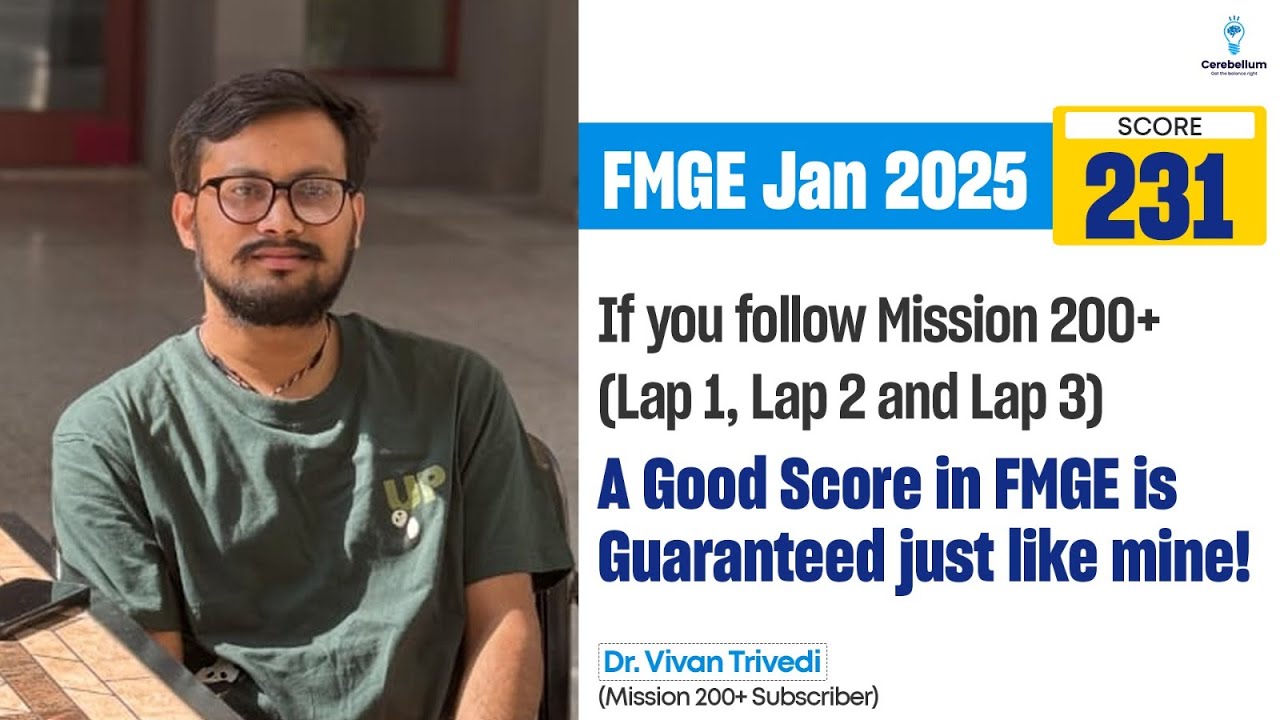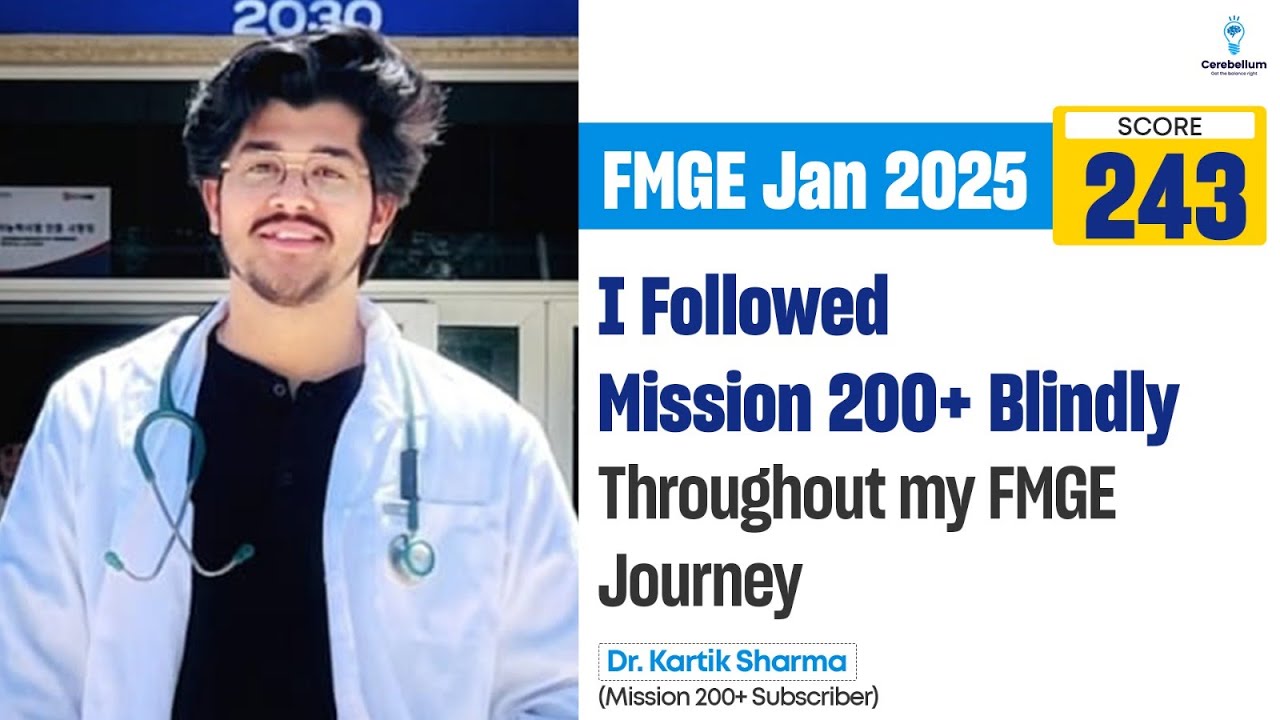Hello students, this is Dr. Praveen Tripathi, faculty at Cerebellum Academy. November INI CET is over and now all of us are planning towards NEET PG 2025.
So, let’s discuss in detail what should be the strategy, how should we structure our preparation and what should be the plan. So, the biggest question is when would we need PG 2025? When is it expected to be held? The answer is, I do not know. I have no clue what NBE is going to decide but I can make a guess.

So, the counselling has been delayed, the choices are now being filled, and even the first batch, the batch that would join based on the first counselling is yet to start. So, if they are starting a batch in December, I don’t think they can start another PG batch anytime before maybe April, May, June, or at least May or June. So, for safety, let’s presume that the exam would happen in April, mid-April or April end.
That I think is a reasonable guess. It’s possible that NBE can take an exam in March but it is very unlikely. So, preparing and planning, keeping April end or mid-April in mind would be a reasonable thing to do here.
So, again, I have no inside information but this is what is a reasonable guess. So, if we are thinking or if we are presuming that the exam will happen in April, mid-April or April end, we have a good number of days left with us and that’s a great thing. If you discount the last one or two years, usually the aims would happen in November or the INI CET would happen in November and in January, we would have NEET PG.
So, the number of days between these two exams was very limited. But the NEET PG counselling got delayed, bad for people who are going to join this batch, bad for PGs who are in their first year and waiting for their juniors but good for you guys who are still preparing. Why? First of all, you still have enough time.
Four and a half months is a significant amount of time when we talk about PG preparation. But there is another advantage. If the NEET PG happens in April, right after that, we would have May INI CET.
So, basically, one after another, you have two exams, two big exams. One after another, that means extra number of seats, that means better chances of getting selected and that means your preparation would be applicable to both these exams. So, these are good things, I believe.
You have more time, you have more seats, you have more opportunity. Say, you are somebody who is just starting with the preparation. Say, you are somebody who started with the preparation, did some subjects but then you just got distracted, your preparation went haywire.
Or say, you are someone who has been studying well but because of any reason, the preparation did not continue and the big question in your mind is, is it still possible to crack the NEET PG exam? Do I have enough time or not? So, students, 130 or 140 days, you know, they are not too many. Ideally, one should have 9-10 months for the preparation. But what happens is and what we have seen over the years is a lot of students who start early and who start very well, start losing momentum in the middle months and many of them, you know, they are not able to keep their preparation at the same level and this happens to many students.
To crack the examination, it is very important to have the momentum right. Your preparation, your productivity, your number of hours should increase and, you know, in the end, you should be at your peak. For many students, keeping this momentum going for one year is very difficult.
So, when we have four, and a half months, the number of days is less but they are enough provided we have momentum going for us. So, 130 days, if you want to study for three hours a day, are they enough? No. But if you are ready to be very disciplined, if you are ready to say that out of 130 or 140 days, whatever they are left, I would be utilizing at least 120 to 125 days.
I would not take breaks more than once in 8-9 days or once in 10 days and I would be clocking at least 10 hours a day or 8 hours a day. If you are ready to do all these things, they are more than enough. The single most important factor is if this NEET PG examination, if this NEET PG examination becomes the focus of your life, if your life starts revolving around this exam for the next four, four and a half months, you can definitely not only crack this exam but get a great rank.
But all these are the conditions. You have to be disciplined. You have to not take too many breaks.
You have to study for a good number of hours. You have to be present when you are studying. Just opening the book or just starting the video and completing a one-hour video in two hours, is not studying.
That means your productivity is 0.5. Not only do you have to increase the number of hours but you should be at your peak of concentration during those hours. So, all these things, if fulfilled, you can definitely crack the examination even if you are starting today. That’s a given.
There is no doubt about it. You would hear multiple stories of students starting in the last three and a half months, three months and cracking the examination. So, if you have that doubt troubling you that is it too late, it is not too late.
The question is, are you ready to give what it takes? And students, I would also say another thing. This is a strange thing. Usually, when people, you know, when they are watching a movie, when they are going out on a date, when they are enjoying watching Netflix, they feel good.
But when you are in a state where you know that you have to prepare for an exam and when you are not studying, do you feel good? The answer is no. Usually, you feel guilty. In fact, sometimes you feel miserable.
Even if you are watching a movie, you are not happy because, in your heart, you know that you should not be doing this. You should be doing something else. So, not studying, spending time on Amazon and Netflix and meaningless crawling, going out watching movies is also not giving you any happiness.
Studying is tough. It is difficult. But at least when you study for 10 hours a day, you go back to bed with a feeling of satisfaction that I did what I was supposed to do.
At least you get the satisfaction here. It is hard work. It is sometimes painful.
But at least you are able to go to bed with a smile on your face that okay, it was a good day. So, if we know in our hearts what is it that we need to do, let’s do it. Let’s not stay in that frustrated state of being.
Let’s take a step. It is difficult. But at least we know that is what we need to do.
Alright, now coming back to the specifics. So, if we presume that we have 135 days, how should we divide these days? You must have heard n number of people saying this that if you want to crack an exam like NEET, PG or INI CET, revision is the key. So, if I’m presuming that you are just starting or your preparation was not so good till now, what we have to do is we have to give the initial period, say three months to strengthen your subject, to go with the first read, to go with the first comprehensive read.
And then we have to revise it in the next 30 days and finally, in the last 15 days, we have to bring everything together and then go and appear for the exam. This is the broad plan. This broad plan becomes even more important if we look at the lessons that the NEET PG 2024 paper taught us.
You must have read what students wrote on social media after the exam. Multiple things are becoming very clear. First of all, just memorizing the facts and PYQs is not going to be enough anymore.
They are asking concepts and even if they are asking questions from the previously asked topics, they are twisting it a little bit. So, if you go for rote memorization, you might find it difficult. You have to have some conceptual understanding before solving the conceptual questions.
Also, unless you have some concepts, even facts are difficult to remember. You cannot remember everything. You cannot just memorize everything.
There should be some kind of link. There should be some kind of association. There should be some kind of understanding to hold these facts.
So, concepts are important, but PYQs and PYTs will always remain important. Exams like NEET PG and INI CET would always test you on factual questions because, in medical sciences, a lot of it is fact. It cannot be changed.
So, while PYQs and PYTs are not sufficient by themselves, they would remain very important no matter what kind of exam it is. A significant number would be PYQs and PYTs. In simple exams, it could reach 70 % or 80 %.
In difficult exams, it would be like 50 %, but 50 %would be PYT. That is a given. In one year, they are not going to create new subjects or new topics in medical sciences.
So, it would always be PYT-based, a significant chunk. But another thing that we learned in NEET PG 2024 was even if the same question is coming, sometimes it’s coming with a twist and that is what we mean when we say you have to learn the art of solving MCQs as well. So, what does it actually mean? Does it even mean anything? Yes, it does.
Knowing something is important, but sometimes apart from knowing something, you should also know how to use that information to solve that MCQ. You should know that in a big question, where is it that you should look? What are the keywords? How to rule out the options? And all these things you do or learn as you continue with solving MCQs. The more MCQs you solve, the better you become at learning the nitty-gritty of answering MCQs.
While your content and your knowledge are the most important things that would help you solve the MCQ, but then there are other things that you learn when you do a lot of MCQs, where even with some information, and some knowledge, you can reach the correct answer. So, this is the second thing. And then exam day surprises.
All of us know that the second session of NEET PG 2024 came as a surprise. It was comparatively tougher. If a student was appearing for that exam, for the first time without any practice with GTs, handling your emotions, handling yourself, not getting anxious, and not getting overwhelmed would have been difficult.
If you do many GTs, what happens is some of them are easier, some of them are difficult, and some of them are moderate. When you do enough GTs, you learn how to handle yourself when things are not going in the right direction. If you’re appearing for a GT and you do not know five questions in a stretch, how do you handle yourself? So, these things are very important.
GTs, as everybody says, are not only to test your knowledge, they are very important practice sessions. They tell you how to sit for those many hours, how to maintain the level of concentration for those many hours and also how to solve the questions in pressure situations. So, all of these things are very important.
Now, coming back to what is needed if you’re starting just now or if you’re starting seriously just now, this is a must. This is a must. I mean, you can take any source in the world, but if you are not disciplined, it’s not going to work out.
You have to be disciplined and you have to do a lot of hard work. Please remember, students, whether you were a topper in your first prof, second prof, third prof, final prof or whether you were an average student, today it does not matter that much because nobody is going to check your marks. But what happens in the preparation year is going to stay with you for the rest of your life.
How well you study will determine your rank and your rank will determine what branch you opt for and what college you opt for. So, this period is going to stay with you for the rest of your life. I would not say that entrance exam is the only way a doctor can become successful, but it is one of the major ways.
That is what takes you from the league of being a UG to the league of being a PG. So, if the stakes are so high, then you have to give an effort which is exceptional. At least in these 4-5 months, you have to work so hard that you end up surprising yourself and believe you, my dear students, we usually do not realize our potential.
This happened to me. Some of you might have seen that video of mine where I talked about how I prepared for my PG entrance examination because I had only 40 days and I was always a good student but I never knew that I could clock 14 hours a day or 13 hours a day of studies. But in those 40 days, I realized that I could do that.
That was a new thing for me. I always thought that I get tired when I am done with the 10 hours or 11 hours of study. But during those 40 days, I realized I can cross 12 hours consistently and that is what you have to do.
You must have a lot of presumptions about yourself that this is what I can study. For this long, my mind works. I need a break after these many days and this is my capability.
But all of those are presumptions. When you sit down there to study and you are completely focused on a goal and when you tell yourself that nothing is going to matter in this world but this exam, then you realize that all those presumptions start failing. You realize you can stretch yourself to 14 hours also.
You realize that you can study on a stretch for two hours, one and a half hours also and you realize that you can get so submerged in the preparation that everything else stops mattering. That is the state I want you to be in because this exam, the result of this exam is going to stay with you. The stakes are high.
So, we need to have discipline. We need to do a lot of hard work but we also have to have a schedule. We need to know for how long this subject is to be studied, where to stop when to revise, and when to focus on MCQs.
A scheduled approach really helps. We already talked about that it’s no longer only about cracking the factual exams. Some questions, a significant number of questions will test your concepts.
So, you have to have conceptual backing. MCQ practice, has been said by everyone who is in this field. You need to know how to solve MCQs.
You need to have good practice in solving MCQs. PYQs, PYTs, the number, the percentage may fluctuate but it would always be significant and GTs. So, this is the broad roadmap.
Now, I’ll talk about how at Cerebellum, we are going to cover all these things. So, in Cerebellum, many of you must know that we have something called as which is the batch program where students who are preparing for INI CET or NEET PG, study. So, we will be coming up with a new batch, batch 3 from November 25th.
From November 25th, we are coming up with a new batch. So, basically what happens in a mission program is, it’s a full-fledged comprehensive program where we focus on all the things that I talked about. So, I talked about discipline, schedule, concept building.
So, for that, we have a structure of live online classes. What we realized was that when we asked students to watch videos on their own and follow a schedule, it is very difficult for them. I have 14 hours of videos.
If I tell you that watch all these videos in the next two days and come back to me, there are high chance that you will not be able to complete it, complete those videos. But if I sit with you live and if I start teaching you and you have to listen to me and study along with me, in all likelihood, in the next two days, we’ll be able to complete those 14 hours or 10 hours or 12 hours, whatever it is, videos. So, to ensure that the students are disciplined and are following the schedule that is being made, we came up with the live online classes.
In the live online classes, the entire subject is taught live by the teacher because these are comprehensive classes. So, concept building happens, interaction happens, the student is able to ask the questions to the teacher, and the teacher is able to look at the comment section and clarify things. But I think the most important part is the interaction.
Since it is happening live, you can continue with the class. When you sit by yourself alone at your home or in the library, the distractions are way too many. It is difficult to continue, it is difficult to sit for those 5-6 hours.
But when the live class is going on, you also have that fear that if you go somewhere, you will miss the remaining class, what would happen tomorrow. So, that brings the discipline in the structure that is so important. So, that is what we do with live online classes.
So, I’ll show you the detailed schedule, but we have live online classes by subject specialists for all the subjects. So, for shorter subjects like psychiatry, anesthesia, we’ll have two days. For bigger subjects like medicine, we’ll have eight days of classes.
The second thing I talked about was MCQs, the art of solving MCQs and the practice of MCQs. So, after a subject is completed in the live lecture, we follow it up with a live test and discussion, what we call E&D in Cerebellum, Exam and Discussion. What it means is, you would be given a test in the morning and you have to appear for it and in the evening teacher comes and does a discussion.
So, like T&Ds, the test and discussions, there are E&Ds. So, this helps you assess your knowledge, how well you know the subject and also makes you better at solving MCQs because when the teacher is teaching you, it keeps on telling you the tricks and what to look for in a question, how to rule out and all those things. So, the way the third batch is structured is, that we’ll have a subject class, we’ll have an E&D for the same and after every two, or three subjects, we will have a BTR E&D, which is taken by Dr. Zainab Vora.
So, basically, say three or four subjects clubbed together, we have a BTR test and discussion. So, those are mixed tests. We have been saying that PYQs and PYTs are very important and then we were thinking about how to ensure to improve the grasp of students on PYQs, and PYTs.
What students do is, they keep on postponing it that, you know, once I am done with the subject, later on, I will do the PYQs and that later never comes because time is always a constraint. So, in Cerebellum, what we do is, we have this late night PYQ marathons, which start at 11 p.m. at night or 10.30 p.m. and basically, these are small tests with 40 or 50 questions mixed back, all the questions are there and you are supposed to take this test as last thing of your day. So, you have studied the entire day, you are tired, you are not very energetic, the test comes, you have to do the PYQs, it takes less effort, right, because you are usually aware of the PYQs, but this brings consistency.
Every day, if you start doing 40, or 50 PYQs, by the end of day 100, you would have covered 5000 PYQs. So, these PYQs, these marathons have questions from the last 10 years, 2015 onwards or is it 2015 or 2016 onwards, but the last 9 or 10 years have been covered. So, when you do it regularly, your hold on the PYQs improves and we add some PYTs as well, so that your hold on these improves.
So, this basically brings you into that habit of solving questions every day, because it’s a test, because you get a rank and everything, you are more likely to appear for it. All the rankers that we talked with after NEET PG 2024, every single one of them said that this late-night PYQ marathon helped them a lot. So, it’s a very important thing.
It takes hardly 20-25 minutes, that too at night, but it makes a significant difference in your final ranks. Grand tests, of course, would be there. At Cerebellum, we try to make grand tests which are similar in level to the actual test, not too easy, not too difficult, but what simulates a real test, an actual test.
As we discussed about it, there are multiple revisions. We have this lab structure, where initial lab, we cover everything, then revision, then revision, so that by the time you appear for the exam, you have done multiple revisions, and things are fresh in your mind. So, lap 1 of batch 3 is going to start from November 25th and it’s going to continue till March 9th.
So, it will have live classes online, it will have tests and discussions, it will be integrated with the BTR schedule of Dr. Zainab Vora and there will be BTR E&D. Lap 2 would start depending upon the date. So, we usually start lap 2 one and a half, two months before the exam.
It includes revisions tests and discussions, depending upon the number of days we get. Lap 3 includes marathons. What is a marathon? Marathon is a super high-yield program in around 7 days and in around 80 hours.
All the 19 faculties would complete everything. They would complete the entire course and this usually happens one week before the exam. The idea is to keep everything fresh in your head when you are going for the exam.
So, they are marathons because you have to sit on a stretch for 10-11 hours, with very small breaks in between and it’s very difficult. It’s not easy but it’s super high-yield. Imagine somebody teaching you everything important two weeks before the exam and you are being taught, you don’t have to do it yourself.
It really helps. Again, all the toppers said that they use Marathon and it was super useful for them. This is the schedule.
So, we are starting from 25th. So, in 5 days, 25th to the 29th, Dr. Gobind Roy Garg sir would be teaching pharmacology and then Dr. Sparsh sir would teach pathology and then we would have a test and discussion of pharma and patho together. So, 5 days for pharma, 5 days for pathology, then Dr. Dilip comes 4 days plus 4 days, 8 days and then his test and discussion in between a break.
Then we have physiology and then look at this, the BTR E&D. So, this is how BTR E&D are scheduled. A couple of subjects and then for all those subjects, we have a BTR E&D.
Then we start with the second cycle. We have forensics, biochemistry, breaks, BTR, and so on and so forth. So, of course, there will be GTs in between.
So, this lap, the detailed lap finishes on the 9th of March. After that, we start with lap 2 and lap 3 depending upon the number of days that are left. So, how to use Mission 2.0 if you are a new student? This is what we suggest.
Attend the live class. Say, I am teaching psychiatry, and attend the live class. Say, you are somebody who does not want live class, you prefer videos, then you can watch the videos also.
Quick revision videos are the concise form, the rapid revision form or the main videos. But we prefer live classes because live classes are comprehensive enough, but they can be finished in time. Sometimes when you try to study yourself, it takes more time.
When somebody is explaining to you, then it becomes easier. So, say for psychiatry, you attend my live class for 2 days and on those 2 days after the class at 11 o’clock, you continue with your late night marathons 20-30 minutes. The next day you get up in the morning, the classes will start at 5.30 pm.
You have the entire morning time. If you are in a job, if you are doing an internship, you can go to your workplace and try to revise over there whatever you studied. If not, then you have more time.
You can use the morning hours for revisions. So, in the morning hours, you revise whatever was taught and also try to do a custom module, say 50 questions from that subject. So, in the morning you revise, you do 50 questions, in the evening you do the class, and in the night you do the late-night PYP marathons.
Once you are done with the subject, we have a subject-wise test and discussion and after or along with that, you can also do the BTR part. So, say for psychiatry, I am teaching you for 12 hours, your concepts are built, and you have most of the factual information. Now, you can add the 2 hours of your BTR because after you complete a subject, it’s very easy to complete BTR.
Once you are done with 12 hours of the main subject content, almost everything you think you already know. So, covering those 2 hours might take 2 hours or even 1.5 hours. So, you are very quickly able to finish it.
If you find something new, just add it to your notes. So, this way you complete the main content and also integrate the BTR and then on the day of BTR E&Ds, you do the sessions. Grand tests again, as we said grand tests have multiple purposes.
They help you assess the preparation. They also are very beneficial because if you take the grand test seriously, the mistakes that you make in the grand test, you will not make the same mistake in the actual exam and they give you very important practice of taking the papers. This is what again we recommend, follow the structure.
If the psychiatry class is scheduled, do psychiatry. When you follow the schedule, you have that pressure that the next subject is about to start and that pressure keeps on pushing you. When you don’t have a schedule or when you have a schedule made by yourself, you tend to miss it a lot.
But when there is a schedule going on, and thousands of students are following it, you also feel motivated. You also feel pushed to follow that schedule. So, follow that schedule.
Of course, all the students of Mission 2.0 have access to all the recorded lectures, main as well as rapid revision in English as well as English. Q Bank is there, which is completely updated. Clinical QBank, GTs are there, BTR, latent PYQs, all of that is there.
Some of the questions that students ask are, what notes should we follow with these classes? So, we have quick revision notes and we have something called workbooks. So, there are students who say that I want to write along with the class. So, we have created printed workbooks in which 70 in some subjects, 70 in some subjects, 80% of the content is written and rest 15-20% spaces are given.
You have to write it yourself. So, if you are somebody who likes to write, which helps you retain things in memory better, you can opt for the workbook. But if you want things should be written, then you can go for quick revision notes.
But please remember, even with quick revision notes, you’ll have to add certain things, certain topics you’ll have to add. So, some amount of writing you have to do, but the majority would already be printed. So, you can use either of those.
Timings of the class are 5.30 pm and they would continue till say 10.30, 10, 11 depending upon how much content is remaining. All the classes are uploaded in the app. So, you can always watch the class the next day if you miss one.
But we suggest that don’t do that because the whole idea of live classes is to create a schedule. If you start missing, the backlog keeps on increasing. What if you have used another source? That is okay.
In case you have used another source, still you can follow the schedule. Say, for the subject of psychiatry, you had used another source. And you are very confident about that source, you remember whatever was taught.
In that case, rather than listening to my lecture, you can revise from that source. You can also listen to the lecture while keeping your notes in front of you. It would be an active recall.
And then appear for the test and discussion. When you appear for the test and discussion, you will see how well you know or not. So, you can mix and match as far as the subjects are concerned.
If you have already attended batch 1 or batch 2, in that case, what should you do? So, batch 2 is at this point in time, it’s still ongoing and it will continue according to its schedule. So, batch 2 students have this option if you want to continue the batch 2 classes, that is what I would also recommend. Once you are done with all of this in December end, then you start following batch 3. If you have done the classes, there is no need to do the classes again.
You can just revise. If you want to revise along with the live class, that is okay. If you want to revise on your own, that is okay.
But appear for the test and discussions, the E&Ds. And also appear for the BTR E&Ds. So, this is what you can do.
The same goes for batch 1. Batch 1, anyway, after CET is over, so you can easily follow the batch 3 schedules. You can do the live classes or if you have done it already, you can just revise and appear for the test and discussions and do the late-night PYQ marathons. What if you are a BTR-only subscriber? In that case, still you would get access to all the BTR E&Ds.
But I would strongly recommend that why don’t you follow whatever is being followed in the mission programs. Because for BTR subscribers also, I believe that they would be reading from some other source. And if things are going perfectly well, fair enough.
But if you want to benefit from the live test and discussions, late-night PYQ marathons, and if you want to attend certain lectures, this is the time to upgrade from BTR to the mission program. You get that BTR upgrade code also, which gives you a significant discount. So, if you are not a subscriber, you can subscribe to the Mission 2.0 plan.
Go to the website in plans. And I think as of now, along with 6 months, 2 months extra validity is being given. Some offers are ongoing.
And the price is some 25k or something of that sort, some near to 25k. So, you can consider joining. So, this is the whole idea students.
And this is, I would say, the most important thing that this is the time when you try to increase the number of hours, increase the effort that you have been putting in because this time is very crucial. What you do in the last 3-4 months often decides finally what your rank is. Because no matter what we do, nobody can remember everything.
And what is done in the last months, which often stays in your mind, gives you your final result. So, this is the time to increase your efforts, to work very hard, to work so hard that you surprise even yourself. And once you are done, once you get that coveted branch, once you get into the college that you always aspire to get in, will all seem worth it.
All the effort, all the pain, all the suffering, all the tears, all the late-night sessions, all the sacrifices, everything starts making sense when that result opens on the screen of your phone or laptop. Work hard, keep studying, take the preparation to the last day and you will definitely crack it. May God bless you all.

